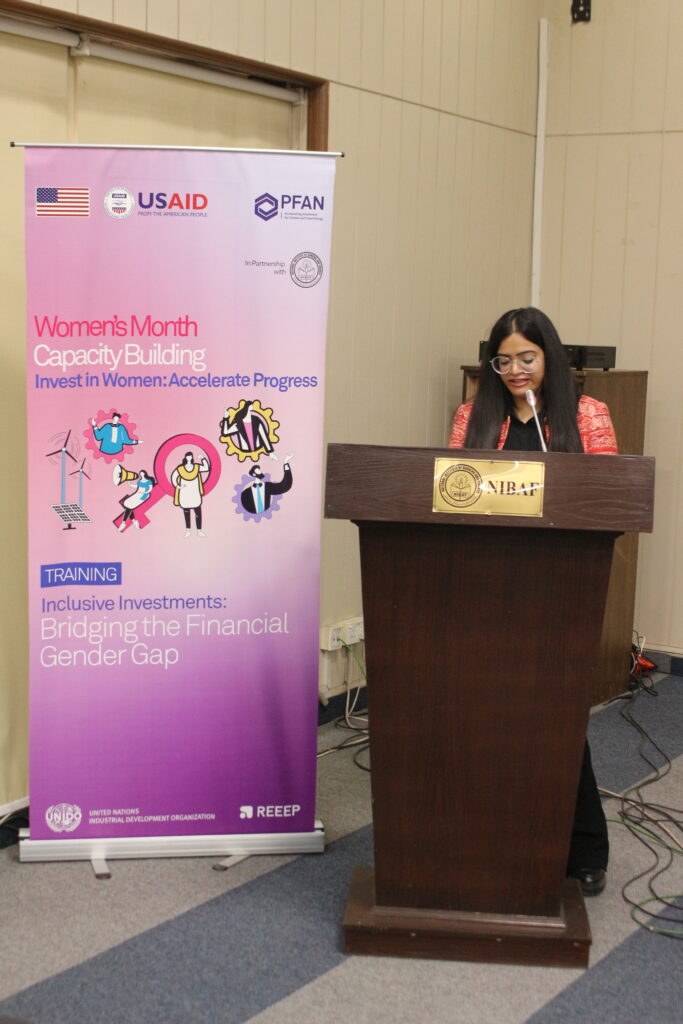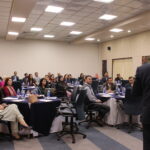
Inclusive Investments: Bridging the Financial Gender Gap Training
This year’s theme for International Women’s Day is ‘Invest in Women, Accelerate Progress’ as evidence is mounting regarding the need for scaling up and implementing gender-responsive financing. Active investments are necessary to build more gender-just infrastructure and change attitudes, at the community and international level.
Thus, the Pakistan Private Sector Energy Project, funded by USAID, implemented by PFAN, and jointly hosted by UNIDO and REEEP, held a training on ‘Inclusive Investments: Bridging the Gender Financial Gap’ on 7th March 2024 at the National Institute of Banking and Finance. Forty-three professionals from leading banks, DFIs, MFIs and development sector participated. Diversity and inclusion professionals from institutions were trained on:
- Integrating social impact into investment decisions and investing in women-led enterprises
- Gender lens investment for product design
- Risk and return in investment decisions
- Navigating legal frameworks related to finance and investments
- Exploring diverse investment avenues and creating and growing personal wealth
- Tailoring investment strategies for women, asset allocation and portfolio management
PPSE Chief of Party, Ahmed Ammar Yasser, opened the training with a succinct overview of PFAN’s work in Pakistan and the project’s gender goals and achievements. He shared a case study about women ushering in revolutions historically, even in fields that are viewed as ‘masculine’, citing the example of Bertha Benz who in 1988 became the first person to drive an automobile a significant distance. He urged out-of-box and stereotype-breaking initiatives from participants.

“Since 2018, PFAN has accelerated their work on gender inclusion in our pipeline. Advisors and companies in our pipeline have gone through gender awareness masterclasses, we have held several gender lens investment trainings and have introduced Gender Action Plans for cleantech SMEs to help increase gender parity in the value chain,” said Ammar Yasser.
The Communications and Gender Lead for the PPSE project, Mavra Bari, contextualized the gender gap in an international context and in dollar terms to help take forward the discussion for finance professionals and leaders.

“A staggering USD 360 billion annual deficit exists to achieve gender equality 2030 in spending on gender-equality measures. Today’s training is taking a granular look in to how more women can be catered to through inclusive banking and finance instruments and products,” shared Mavra Bari.
The State Bank of Pakistan of the country’s premier finance authority and looks into many ranges of banking to deal with changes in the economic climate and different purchasing and buying powers. Thus, SBP plays a pivotal role in establishing banking standards and infrastructure for gender balance and parity. Banking on Equality Policy is a landmark policy by SBP, to reduce the gender gap in financial inclusion by bringing a shift towards women friendly business practices in the financial sector.
Uzma Mansoor, Joint Director SME, Housing and Sustainable Finance Department, SBP kicked off the formal training sessions and expounded upon SBP’s Refinance and Credit Guarantee Schemes for (Women) Entrepreneurs and Financiers.

“Many countries have set up women entrepreneurship desks and placed a woman champion who can address grievances and provide credit and advisory services. SBP is trying to streamline this initiative in Pakistan under Banking for Equality which will really shift industry standards,” shared Uzma Mansoor.
Ace trainer Sabahat K. Bokhari who is a Diversity, Inclusion & Equity, and Leadership Expert, Certified D&I Professional from University of South Florida, USA and Certified Strategy Management, Harvard University with over 23 years of diverse experience in human resource transformation and organizational development led a vibrant and engaged training on inclusive investment and financial product development.

“For financial inclusion we first need to think of social inclusion because women face many systemic challenges. For this we have to think innovatively. The first step is having a diverse workforce and women in leadership because when there’s more women in the team, there will be more creative problem solving,” said Sabahat Bokhari.
Bokhari further urged that all genders need to treated with respect and bankers should go through soft skills trainings, especially while dealing with customers from the transgender-community.
The session also introduced the concept of ‘pink-washing’ whereby institutions and companies re-brand existing products and services as women-facing while not actually making the banking product more equitable and women-facing, for instance, credit cards, savings accounts and schemes.
Participants engaged in several case-building activities where they were given scenarios to build banking products for women’s differential needs and circumstances. The trainer’s assumptions were validated as teams with women and women-only teams had the most innovative and creative financial instrument solutions.
Khusro Mumtaz, Chief Risk Officer, InfraZamin Pakistan shared a case study on South Asia’s First Gender-bond empowering women impacted by Pakistan 2022 Floods. He noted that this was the first-ever gender bond in the MENA region too and something Pakistan should be very proud of pioneering.

“When investors see that women are good lenders and paying back on time, the risk appetite will increase in the market and bring changes structurally. Housing rehabilitation will allow families to lend for longer so if they there is a next flood, they will be better prepared,” said Khusro Mumtaz.
The training was closed by Riaz Chunara, Managing Director, NIBAF, who commended the organizers and participants efforts and shared that NIBAF is committed to help build the capacity of the finance sector in the country, particularly in helping bring more women to decision-making and entrepreneurial positions.

“We hold several trainings for women entrepreneurs as we know that women invest back in their families and communities that will help the entire country grow. We hope to see you all at our other sessions as well and urge you to keep working together on uplifting different sections of society,” said Riaz Chunara.








